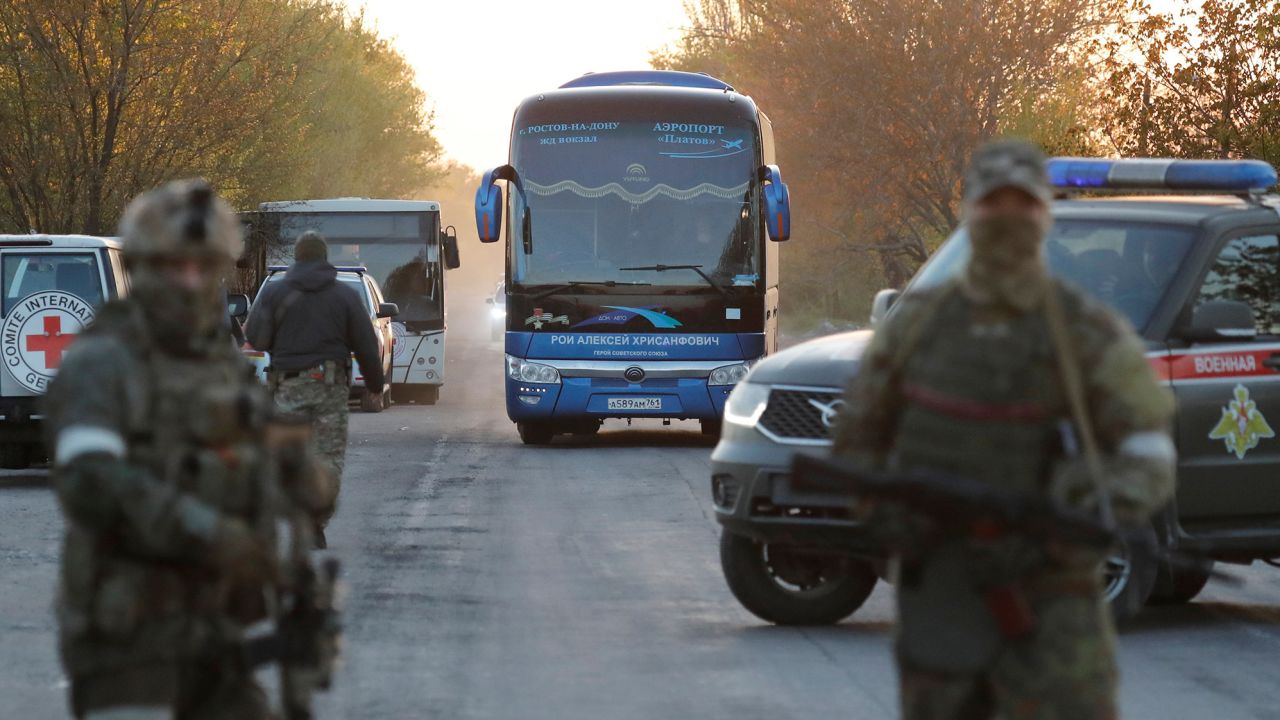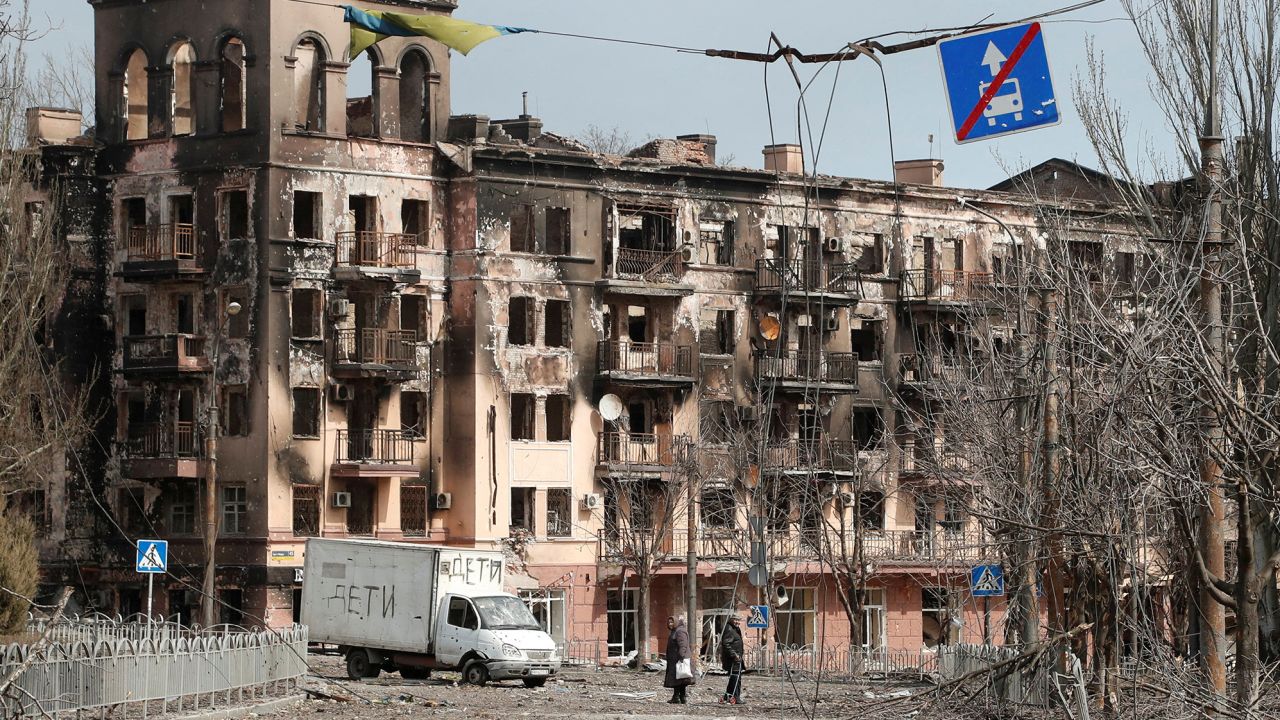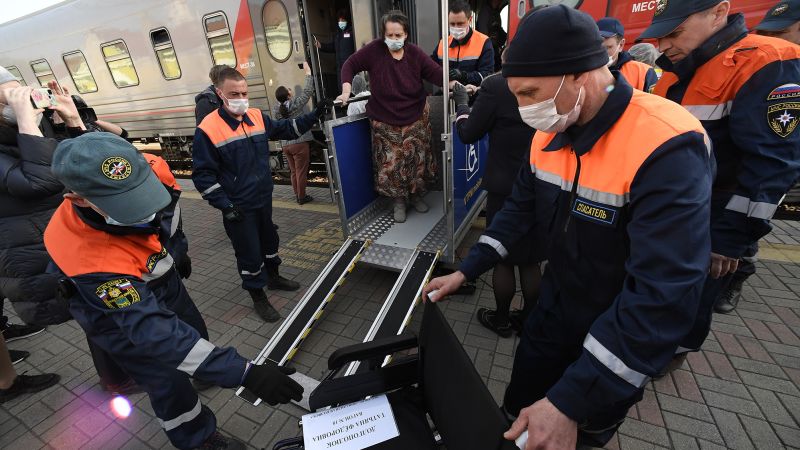CNN
—
A year ago, Natalia’s life was upended by war. With her family, she fled the fighting in Ukraine’s southeastern city of Mariupol and crossed into Russia.
From there, she and many other Ukrainians were encouraged by Russian authorities to take a 4,000-mile train journey east to the very edge of Siberia, to a coastal town called Nakhodka on the Sea of Japan, a stone’s throw from North Korea. It’s closer to Alaska than to the front lines.
In the absence of a reliable evacuation corridor to Ukrainian-held territory, going to Russia was the only option for many people in Mariupol at that time. Ukraine describes these refugees as forcibly deported, though Natalia says no one forced her to leave. “It was our decision,” she told CNN by phone from Russia’s far east, where she has resettled since arriving last spring.
Now, as Russia’s war in Ukraine grinds into a second year, she and others lead an uncertain existence, unsure if, or when, they will ever be able to return home or be welcome when they get there.
Over the course of many months, CNN has managed to reach a handful of Ukrainians through a group chat run by Russian volunteers for current and former residents of a hotel used as a temporary shelter, where they stayed while searching for longer-term work and housing. CNN is not using their full names in this story for privacy and security reasons.
Many of the new arrivals in Nakhodka, in Russia’s Primorskiy Krai region, were reluctant to say much about their circumstances or share their opinions, but others shared enough to get a clearer snapshot of life in Russia’s far east and how Ukrainians there are adjusting.
Some offered mildly pro-Russian views, others declined to answer questions about the war, while some even gave scathing criticism of Ukraine. No one directly criticized Moscow but, of course, it’s not clear how freely people felt they could speak.
The United Nations estimates more than 2.8 million Ukrainians have taken refuge in Russia over the past year. Some – largely those who could afford it – have transited through Russia to other countries in Europe, and many have even made it back to Ukraine.
International law prohibits forcible transfers of people and stipulates that evacuees should be moved home as soon as hostilities have ceased. CNN requested comment from the Russian Ministry of Internal Affairs on Ukraine’s allegation that its citizens have been forcibly deported to Russia, and on the situation for Ukrainians now living in Russia’s far east, but has not received a response.
Their mere presence in Russia is ultimately a win for the Kremlin, according to Nathaniel Raymond, executive director of Yale University’s Humanitarian Research Lab, who has done extensive research on the mass migration of Ukrainians to Russia since the full-scale war began. Russia, he says, needs more people.
“In many parts of the country, they don’t have enough citizens to make those municipalities function,” he said. There is also “a propaganda benefit, positioning these people as somehow, willingly seeking citizenship in Russia, which fits this broader narrative that Putin and the Kremlin [are pushing]… trying to rebrand the war as saving Ukrainians from purported Nazis.”
Russia has tried several experiments to attract people to its resource-rich far east, including from ex-Soviet states. Now, state programs are being repurposed to accommodate fleeing Ukrainians. Those who agree to go to Russia’s far east are promised a cash payment, housing assistance, Russian citizenship and potentially even free land.
The cost of living in Primorskiy Krai, whose main city is Vladivostok, is the 11th-highest in Russia, more expensive even than Moscow and St. Petersburg regions, according to official figures. This is due in part to the rate of new home-building lagging behind the national average.
Natalia, who was an office worker in Mariupol, has now found work in a local food-processing plant. She told CNN she’s struggling with the cost of rent. She hopes to find a job that better matches her skills, but for now it’s all she can find. She misses home, but at least the maritime climate reminds her of coastal Mariupol. Her husband and daughter are with her, and she says she has no family remaining in Ukraine.
“Nothing’s changed (in the past year) except the place,” she said. “But I no longer have a job that I love and a home I love.”
Russian authorities took her Ukrainian passport and swapped it with a Russian one, Natalia says. The UN Universal Declaration of Human Rights says that “no one shall be arbitrarily deprived of his nationality” and that everyone has a right to leave any country, even their own.
When Natalia spoke to CNN, she seemed resigned to making the relocation work for her family long term. Under the terms of her resettlement, she must live there for at least three years, or be forced to repay any state benefits her family has received.
Ukrainian people who have signed on for the years-long program are in “basically a degree of indentured servitude,” Raymond said. “Being in a contract, so to speak, for three years puts them in a very vulnerable position.” It’s critical to recall that their core rights under international law mean “they have a right to return, and they have a right to return safely,” regardless of any agreement, he said.
Natalia is allowed to travel freely but says she won’t go back to Ukraine. “Those who left for Russia are immediately considered criminals by the Ukrainian authorities, so I am forbidden to go there,” she told CNN by phone. “I don’t want to take the risk,” she added, even if she still had a Ukrainian passport.

Others who spoke to CNN also expressed reluctance to return. “We will stay in Russia. I don’t even want to think about Ukraine,” Valeriya, another Ukrainian who ended up in Nakhodka, told CNN by text.
“At this point, the absence of clarity is the biggest problem” when it comes to Ukrainians in Russia, and whether they are free to return home, Raymond said.
“There is, understandably, within Ukraine an absolute outrage against those who are perceived as collaborators. But the fact of the matter is that we are dealing here with a civilian population … that was seeking refuge in a time of war,” he said. Raymond says there have been local examples in Ukraine of reprisals against perceived collaborators – even against those who merely fled east because it was their only way out of the war zone.
Kyiv, he says, must make it crystal clear that Ukrainians citizens who ended up in Russia can come home, otherwise, many likely won’t. And that only serves Russia’s interests.
The Ukrainian Ministry of Reintegration referred CNN’s questions to the Ukrainian Prosecutor General’s office. In a statement, it told CNN that it recognizes that for many people “the only safe passage was through Russia. Of course, they are not considered collaborators […] They need to get to any third country and address a local Ukrainian consulate. It will issue them Ukrainian documents to return to Ukraine.” It’s less clear whether those Ukrainians who remain in Russia long term will be welcomed back without issue.
By law, Ukraine considers those who publicly deny occupation, assist the Russian military in Ukraine, or even call for support of Russian actions, to be collaborators and liable for criminal penalties.
Oksana, another of the Ukrainians in Nakhodka who says she now has both Ukrainian and Russian passports, says she would like to return to Mariupol to visit, but only if it’s part of Russia.
“Somehow things are better in Russia – quieter, whereas it is a total mess in Ukraine. It is just unclear what it is that our government is doing,” she told CNN by phone, adding: “I am for peace all over the world.”
Fellow Ukrainian Marina wrote in a text message that after three years, “We will see. It depends on the job and material well-being. So far, it’s not very easy.”

Raymond suspects that many of those who ended up in Russia’s far east are less affluent, and therefore less likely to take the long, expensive trip back to Ukraine should they want to go. War after war, the same pattern can be seen – those with the least money have the fewest options, he says.
“It is those who don’t have the means to flee through Europe, through the Baltics, that often get stuck in situations where they can be exploited.”
The United States’ National Security Council declined to say whether Ukraine should do more to assure citizens who fled to Russia that they can re-enter with no issue. But it said the US is providing assistance to identify and locate Ukrainian refugees who have been detained and interrogated in Russia and is imposing sanctions and visa restrictions on Russian officials and companies in order to hold Russia accountable for what the US describes as forcible deportations.
Oksana says Russia was never part of her plan, even as she took shelter in a squalid basement shelter in Mariupol while the city was besieged by Russian forces.
“I was going to stay and die there, were it not for my daughter who said, ‘Mom, I don’t want to eat like this and die in the basement.’” With Oksana’s brother already in Russia’s far east, they decided to go.
Oksana says the volunteers have been helpful and that although some locals have suggested she “go back,” others have encouraged her to stay – which, for now, is what she intends to do.

